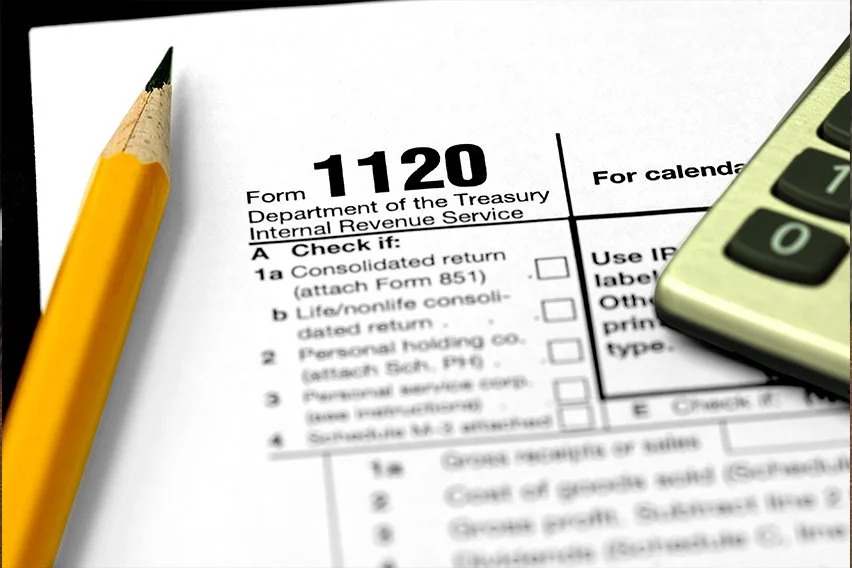Filing Form 1120, the U.S. Corporation Income Tax Return, is a critical task for businesses structured as C corporations. This form reports a corporation’s income, gains, losses, deductions, and credits, determining its tax liability.
While the process may seem straightforward, many businesses make mistakes that can lead to complications, including tax liens and penalties from the Internal Revenue Service (IRS).
Here are some common errors to avoid to ensure a smooth filing process and minimize your risk of facing tax issues.
1. Incorrect or Incomplete Information
One of the most common mistakes is providing incorrect or incomplete information on Form 1120. This can include errors in
- company’s name,
- address,
- Employer Identification Number (EIN), and
- financial details.
Such mistakes can lead to delays in processing your return and potential penalties. Double-check all information before submission to avoid these issues.
2. Miscalculating Income and Deductions
Accurate reporting of income and deductions is crucial. Misreporting can result in either underpayment or overpayment of taxes, both of which have negative consequences.
Underreporting income or overstating deductions can trigger an audit by the IRS, leading to additional tax assessments, interest, and penalties. Utilize accounting software or consult with a tax professional to ensure precise calculations.
3. Ignoring Carryovers and Credits
Many businesses overlook valuable tax carryovers and credits, which can significantly reduce tax liability. Net operating loss (NOL) carryovers and tax credits, such as the general business credit, should be properly accounted for.
Failing to do so means missing out on potential tax savings. Keep detailed records and consult a tax advisor to maximize these benefits.
4. Not Filing on Time
Missing the filing deadline for Form 1120 can result in late filing penalties. The due date for most corporations is the 15th day of the fourth month after the end of the corporation’s fiscal year. For calendar-year corporations, this means April 15th.
If you cannot file on time, request an extension using Form 7004 to avoid penalties. However, remember that an extension to file is not an extension to pay any taxes owed.
5. Failure to Reconcile Book and Tax Income
Discrepancies between book income (financial accounting) and tax income (tax reporting) can raise red flags with the IRS. Schedule M-1 (or Schedule M-3 for larger corporations) is used to reconcile these differences.
Ensure that you accurately complete this schedule to reflect any differences and avoid potential audits.
6. Not Consulting a Tax Professional
Navigating corporate tax laws and regulations can be complex. Many businesses make the mistake of not seeking professional assistance, leading to errors that could have been avoided.
A tax debt attorney in Irvine, CA, can provide invaluable guidance, especially if your corporation has past tax issues. They can help with penalty abatement and negotiating with the IRS to resolve any disputes.
7. Overlooking Tax Liabilities for Subsidiaries
If your corporation owns foreign subsidiaries, it is essential to report their income correctly.
The Tax Cuts and Jobs Act (TCJA) introduced new reporting requirements, such as Global Intangible Low-Taxed Income (GILTI). Ensure compliance with these rules to avoid substantial penalties.
8. Ignoring Tax Liens and Debt
If your corporation owes back taxes, ignoring the situation can lead to severe consequences, including tax liens. A tax lien is a legal claim against your property due to unpaid tax debt. It can affect your credit rating and business operations.
Addressing tax debt promptly and seeking professional help from a tax debt attorney in Irvine, CA, can prevent these issues. They can assist in negotiating with the IRS and exploring options such as penalty abatement.
9. Incorrectly Reporting Capital Gains and Losses
Accurate reporting of capital gains and losses is crucial. Misreporting can lead to discrepancies in your tax return and potential audits. Use Schedule D (Form 1120) to report capital gains and losses correctly, ensuring all transactions are documented accurately.
10. Neglecting State Tax Obligations
While Form 1120 is a federal tax form, corporations must also comply with state tax obligations. Each state has its own tax laws and filing requirements. Ensure that you understand and meet these obligations to avoid state-level penalties and interest.
Conclusion
Filing Form 1120 accurately is vital for maintaining your corporation’s good standing with the IRS and avoiding tax complications.
By being aware of these common mistakes and taking steps to prevent them, you can ensure a smoother filing process. If you face challenges, consider consulting a tax professional or a tax debt attorney in Irvine, CA, who can provide expert advice and assistance, helping you navigate complex tax issues, including tax liens and penalty abatement. Proper preparation and attention to detail can save your corporation from costly errors and penalties.
